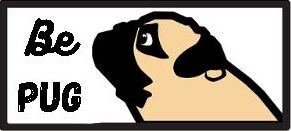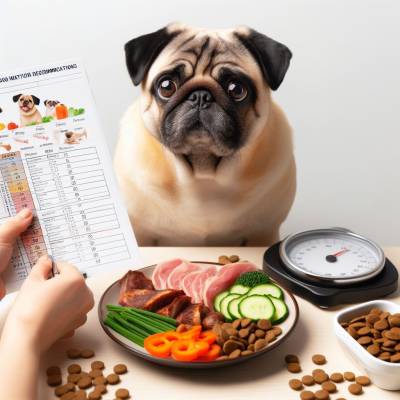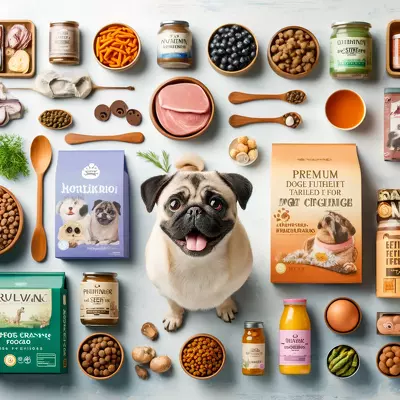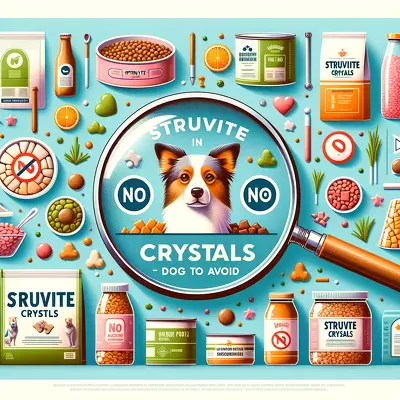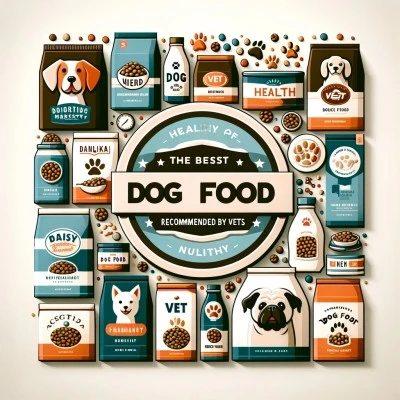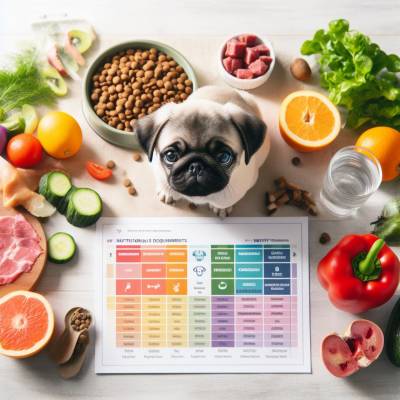Doggie Dietary No-Nos: The Ultimate Guide to Dogs Foods to Avoid

Dogs’ dietary needs are unique, and certain foods can be harmful. This article delves into foods to steer clear of, ensuring your canine companion’s safety. By understanding these potentially dangerous consumables, we can better safeguard our pets’ health and well-being. Avoid these edibles for a happier, healthier pup.
I. Introduction
A. Navigating the Canine Culinary Landscape
Our pets, especially our beloved dogs, are more than just animals; they are family. With wagging tails and unwavering loyalty, they grace our lives with joy and companionship. Just as we care about the nourishment of our family members, ensuring a proper diet for our dogs is paramount. Dogs, by nature, are curious creatures. They often use their mouths to explore their environment, sometimes biting into things they shouldn’t. While sharing our meals with those pleading eyes is tempting, it’s essential to be aware of what constitutes a balanced and safe diet for them. Foods for humans aren’t always suitable for our furry counterparts, and knowing the difference can greatly influence their longevity and quality of life.
B. The Tightrope Walk between Treats and Threats
We live in an age of culinary exploration, with our kitchens stocked with myriad foods from around the globe. Yet, what might be a delightful treat for us can be a hidden danger for our four-legged friends. Inappropriate edibles can range from those causing mild digestive disturbances to those that are life-threatening. Recognizing these hazards can be daunting, especially given today’s vast information. Still, it’s a task that every responsible pet owner should undertake. By understanding the foods to avoid, we’re keeping our dogs safe and ensuring they remain active, exuberant, tail-wagging companions for years.
II. Common Household Foods Harmful to Canines
A. Chocolate: The Bittersweet Truth
Chocolate, a favorite treat among many humans, harbors a dark secret regarding our canine companions. The primary culprits in chocolate are theobromine and caffeine, two stimulants that dogs process far more slowly than humans. Dark and baking chocolates contain the highest levels of these compounds. Ingestion can lead to many symptoms in dogs, ranging from vomiting and diarrhea to more severe effects like heart arrhythmias, tremors, seizures, and even death. But, even a small amount can be lethal, making it imperative to keep chocolates out of paw’s reach.
B. Grapes and Raisins: Small Fruits, Big Problems
While the exact substance that makes grapes and raisins toxic to dogs remains a mystery, their danger is undebatable. Even a handful can induce acute kidney failure in some dogs, which can be fatal if not treated promptly. The symptoms post-ingestion include vomiting, diarrhea, lethargy, and loss of appetite. Given the unpredictable nature of their toxicity – with some dogs showing no effects while others become severely ill – it’s best to steer clear of these fruits entirely.
C. Onions and Garlic: A Pungent Peril
Regardless of their form (raw, cooked, powdered), both onions and garlic contain thiosulfate, a compound toxic to dogs. While garlic contains less than onions, it can still pose a threat. Consuming these can lead to oxidative damage to red blood cells, causing them to burst—a condition called hemolytic anemia. Symptoms may not appear immediately, but a dog might show weakness, lethargy, pale gums, and even dark-colored urine over time. It’s essential to be vigilant about dish ingredients and prevent dogs from scavenging food scraps that might contain them.
III. Nuts and Their Effects on Canines
A. Macadamia Nuts: A Dangerous Delight
Macadamia nuts, often found in cookies or simply as snacks, are toxic to dogs. Ingesting even a small amount can lead to weakness, vomiting, tremors, and hyperthermia symptoms. The exact toxin is yet to be identified, but it’s evident that these nuts have a pronounced effect on a dog’s nervous system. Swift action is necessary if consumption is suspected.
B. Almonds: Crunchy Concerns
While almonds aren’t as toxic as other nuts, they aren’t exactly canine-friendly either. Their shape and size can pose a choking hazard, especially for smaller dogs. Additionally, they can cause gastrointestinal distress, leading to vomiting and diarrhea. The high-fat content can also contribute to pancreatitis, a painful pancreas inflammation. It’s best to offer safe and beneficial alternatives for dogs rather than risking potential almond ailments.
C. Walnuts: Beware of the Shell
Walnuts, especially black walnuts, can pose several dangers to dogs. The nuts can get moldy, producing toxins that can induce dog seizures. Additionally, the hard shell can cause obstructions in the digestive tract. Like almonds, they also have a high fat content, posing a risk for pancreatitis. Given these potential threats, excluding walnuts from any dog-friendly snack list is prudent.
IV. Sweeteners and Their Impact
A. Xylitol: A Sugar Substitute with Deadly Consequences
Xylitol, a common sugar substitute in many products, including gum, candy, and baked goods, has a deadly secret regarding dogs. Ingestion of even minute amounts can rapidly release insulin in dogs, causing hypoglycemia (low blood sugar). Symptoms of xylitol poisoning can manifest within 15-30 minutes and may include vomiting, loss of coordination, seizures, and in severe cases, liver failure. Given its widespread use in various products, always checking ingredient lists and keeping any xylitol-containing items out of dogs’ reach is critical.
B. Treading Lightly with Other Artificial Sweeteners
While xylitol is the most toxic sweetener to dogs, other artificial sweeteners like aspartame, saccharin, and stevia, though less harmful, can still cause digestive upset if consumed in significant amounts. Aspartame, for instance, can lead to neurological issues if ingested in vast quantities. However, the risk is relatively low due to the large amount needed for toxic effects. Nevertheless, it’s wise to approach all artificial sweeteners cautiously, ensuring they aren’t a regular part of your dog’s diet.
V. Unfamiliar Fruits and Vegetables
A. Avocados: Not Just Toast Toppers
While avocados are hailed as a superfood for humans, they contain a substance called person, which can be harmful to dogs when consumed in large quantities. Most people are in the pit and bark, but the flesh still contains small amounts. Ingestion can lead to gastrointestinal irritation, vomiting, and diarrhea. Moreover, the pit poses a significant choking hazard and can lead to intestinal blockages if swallowed.
B. Stone Fruits: Potential Pitfalls
Due to their pits, stone fruits such as peaches, plums, and cherries can be a choking hazard. In addition to the choking risk, these pits contain cyanogenic glycosides, which can result in cyanide poisoning when ingested. Signs of poisoning include dilated pupils, difficulty breathing, and shock. Although the fruit’s flesh is generally safe in moderation, it’s best to ensure they are pit-free and given in controlled amounts.
C. Tomatoes: A Green Alert
While ripe tomatoes are generally considered safe for dogs in moderation, green tomatoes and plants contain solanine, a toxic alkaloid. Solanine can cause gastrointestinal distress, lethargy, and weakness. As the tomato ripens, the solanine levels decrease. To be on the safe side, it’s advisable to keep dogs away from tomato plants and ensure they only consume ripe tomatoes, devoid of stems and leaves.
VI. Alcoholic and Caffeinated Products
A. Alcohol: Not for Paws and Whiskers
Alcohol can be extremely dangerous for pets in beverages, certain foods, or even some household products. Its effects on dogs can be much more pronounced than on humans due to their smaller size and different metabolism. Consumption can lead to many symptoms, including vomiting, disorientation, high body temperature, restlessness, tremors, and even respiratory failure. In severe cases, it can be fatal. It’s essential to ensure that alcoholic products are kept securely out of reach and that spills are promptly cleaned up.
B. Caffeine: More Than Just a Morning Jolt
While humans might rely on caffeine for a daily pick-me-up, this stimulant can be life-threatening for dogs. Common sources of caffeine include coffee, tea, energy drinks, and certain medications. When ingested, it can cause rapid heartbeat, hyperactivity, vomiting, high blood pressure, tremors, and seizures. Due to its potent effects and potential toxicity, it’s vital to keep caffeine-containing products away from pets and be vigilant about items like discarded coffee grounds or tea bags.
VII. Dairy Products and Lactose Intolerance
A. Milk: A Pup’s Childhood Misconception
Many of us might picture puppies lapping up bowls of milk, but the reality is a bit more complicated. Like many other mammals, dogs can become lactose intolerant as they age. This means they lack sufficient lactase, the enzyme required to digest lactose in milk properly. While some dogs can tolerate milk without issues, others may experience diarrhea, stomach upset, and gas. It’s best to monitor your dog’s reaction and opt for lactose-free alternatives or skip milk altogether if they show signs of discomfort.
B. Cheese: A Tasty Treat with a Side of Caution
Cheese can be a delicious treat for dogs in moderation, but it’s not without its concerns. Some cheeses’ fat and lactose content can lead to digestive issues, especially in dogs that are lactose intolerant or have sensitive stomachs. Additionally, some types of cheese, especially those with added seasonings or herbs, can contain harmful ingredients to dogs. When offering cheese, it is recommended to choose low-fat, plain varieties and give it in small amounts. Always avoid cheeses containing garlic, onion, or other potentially toxic ingredients.
VIII. Bones and Other Choking Hazards
A. Bones: A Treat or a Threat?
Bones, often romanticized as a quintessential dog treat, come with their own set of concerns. While it’s true that many dogs love to gnaw on bones, not all bones are safe. Cooked bones can easily splinter, leading to choking, internal injuries, or obstructions. Even raw bones, if not suitable for the dog’s size or breed, can pose choking risks or damaged teeth. It’s crucial to differentiate between the bones that can be offered and those that should be avoided.
B. Beware of the Bite-Sized: Small Objects and Their Risks
Beyond bones, many households contain small objects that can be incredibly hazardous to dogs if ingested. Toys with detachable parts, children’s play items, or even certain dog toys can pose choking risks. Furthermore, swallowed items can lead to intestinal blockages, which can be life-threatening. Dog owners must be vigilant, ensuring toys are appropriate for their pet’s size and regularly checking them for wear and tear. It’s always better to err on the side of caution and remove any item that could potentially harm your furry friend.
IX. Raw Food Controversies
A. The Raw Debate: Meat and Microbes
Feeding raw meat to dogs is a contentious issue, with advocates touting benefits like improved coat health and higher energy levels. However, critics point out significant concerns, primarily the risk of pathogen contamination. Raw meats can harbor harmful bacteria like E. coli or Salmonella, harming dogs and humans in the household. While there are ways to mitigate these risks, like sourcing meat carefully and maintaining strict hygiene standards, dog owners must be well-informed before opting for a raw diet.
B. The Egg Enigma: Raw Potential or Raw Concern?
Raw eggs have been praised for their protein and nutrient content, and some dog owners believe they’re a beneficial addition to a canine diet. However, concerns arise with the avidin in egg whites, which can interfere with the absorption of biotin, a crucial B vitamin. Biotin deficiency in dogs can lead to skin and coat problems. While occasional raw eggs might not cause harm, and the yolks are rich in biotin, it’s essential to be aware of the potential risks and ensure a balanced approach to feeding. If considering raw eggs, consulting with a veterinarian or pet nutritionist is advised.
X. Fatty Foods and Pancreatitis Risks
A. Fatty Meats: Delicious yet Deceptive
The aroma of fatty meats like bacon, sausages, or ham is irresistible for many dogs. However, these meats can be a double-edged sword. Rich in fat, they can overwhelm a dog’s digestive system, leading to pancreatitis—a painful inflammation of the pancreas. Pancreatitis symptoms include vomiting, abdominal pain, diarrhea, and lethargy. It’s a condition that requires immediate medical attention. While treating your dog occasionally is okay, it’s crucial to ensure that such treats are lean, appropriately portioned, and devoid of harmful additives.
B. Oils and Butter: Sliding into Trouble
While some oils can be beneficial in controlled amounts (like fish or flaxseed oil), others can be problematic for dogs. When given in large amounts, butter, lard, and certain cooking oils can contribute to obesity, pancreatitis, and other health issues. It’s also essential to know specialty products, like cocoa butter or macadamia oil, which might contain harmful compounds. When using oils or butter, moderation is key. And always be wary of products with added ingredients or seasonings that could be toxic.
XI. FAQs
Q: Are all fruits and vegetables safe for dogs to eat?
A: No, not all fruits and vegetables are safe. Some, like grapes, raisins, and onions, are toxic to dogs. Always research before introducing a new food to your pet.
Q: Can I give my dog bones from my dinner?
A: It’s best to avoid giving cooked bones as they can splinter and pose a choking hazard or cause internal injuries. Instead, opt for bones designed for dog consumption.
Q: Why is chocolate harmful to dogs?
A: Chocolate contains theobromine and caffeine, which can be toxic to dogs, leading to symptoms like vomiting, seizures, and even death.
Q: Can dogs drink milk?
A: Some dogs can tolerate milk, but many become lactose intolerant as they age, leading to digestive issues. It’s best to offer in moderation and observe for any adverse reactions.
Q: Are nuts safe for dogs?
A: Not all nuts are safe. Macadamia nuts are toxic to dogs, while others, like almonds, can pose choking hazards or digestive issues.
Q: Is it okay for dogs to consume alcohol in small amounts?
A: No, even small amounts of alcohol can be dangerous for dogs, leading to poisoning symptoms and, in severe cases, death.
Q: Are artificial sweeteners safe for dogs?
A: Some artificial sweeteners, like xylitol, are extremely toxic to dogs. Always check the ingredients of products and keep them away from pets.
XII. Conclusion
A. Traversing the Food Landscape: A Quick Recap
Though curious and eager to taste the world around them, dogs depend on their human companions to ensure their dietary safety. From the intoxicating allure of chocolate to the seemingly innocent grape, numerous everyday foods can spell trouble for our canine friends. Fatty meats, certain oils, and some fruits and vegetables might be palatable but difficult in the long run.
B. Dietary Diligence: A Lifesaver
Being vigilant about what our dogs consume isn’t merely a task—it’s a responsibility that can greatly impact their well-being and longevity. By being informed and cautious, we not only prevent potential harm but also pave the way for a wholesome, balanced diet that supports their vibrant health.
XIII. Suggested Readings
In the quest to provide our furry friends with the best nutrition possible, there is a wealth of resources available for pet owners. Books written by veterinarians and pet nutrition experts can be invaluable in offering guidance. Here’s a list of insightful reads that delve into canine diet, health, and the foods that are best left out of their bowl.
- “Feed Your Best Friend Better” by Rick Woodford – This book provides easy recipes and straightforward advice on how to cook for your dog, ensuring they get the nutrients they need.
- “Dog Food Logic: Making Smart Decisions for Your Dog in an Age of Too Many Choices” by Linda P. Case – A comprehensive guide to choosing the right dog food with a scientific approach.
- “The Whole Pet Diet: Eight Weeks to Great Health for Dogs and Cats” by Andi Brown – This title focuses on holistic health and includes a plan to improve your pet’s diet over eight weeks.
- “Canine Nutrigenomics: The New Science of Feeding Your Dog for Optimum Health” by W. Jean Dodds and Diana R. Laverdure – Explores how diet can affect a dog’s genetic expression and overall health.
- “Raw and Natural Nutrition for Dogs” by Lew Olson – Offers information on raw diets for dogs, examining the benefits and considerations of this feeding approach.
After exploring these comprehensive guides, pet owners will be better equipped to make informed decisions about their dog’s diet. With a focus on avoiding harmful ingredients and embracing whole, beneficial foods, these books serve as a roadmap to a healthier, happier canine.
